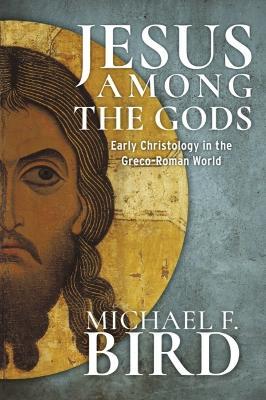Jesus Among the Gods: Early Christology in the Greco-Roman World

Jesus Among the Gods: Early Christology in the Greco-Roman World
After several centuries of controversy, the early church came to an uneasy consensus that Jesus was both fully human and fully divine. In his divinity, orthodox Christianity claimed, he shared fully in the nature of the uncreated creator God. But was this doctrinal position crafted from whole cloth in the era of the great ecumenical councils? How did earlier Christ-followers understand Jesus in light of their convictions about the one supreme deity and in the context of a cultural milieu saturated with gods?
In Jesus among the gods, Michael Bird gives renewed attention to divine ontology--what a god is--in relation to literary representations of Jesus. Most studies of the origins of early Christology focus on christological titles, various functions, divine identity, and types of worship. The application of ontological categories to Jesus is normally considered something that only began to happen in the second and third centuries as the early church engaged in platonizing interpretations of Jesus. Bird argues, to the contrary, that ontological language and categories were used to describe Jesus as an eternal, true, and unbegotten deity from the earliest decades of the nascent church.
Through comparison with representative authors such as Philo and Plutarch, and a comprehensive analysis of Jesus and various intermediary figures from Greco-Roman religion and ancient Judaism, Bird demonstrates how early accounts of Jesus both overlapped with and diverged from existing forms of religious expression. However Jesus resembled the various divine agents of Greco-Roman religion and Second Temple Judaism, the chorus of early Christian witnesses held Jesus to be simultaneously an agent of and an analogue with the God of Israel. Among the gods, Jesus stood in clear relief, a conviction that may have been refined over time but that belongs to the emerging heart of Christian confession.
PRP: 530.40 Lei
Acesta este Pretul Recomandat de Producator. Pretul de vanzare al produsului este afisat mai jos.
477.36Lei
477.36Lei
530.40 LeiLivrare in 2-4 saptamani
Descrierea produsului
After several centuries of controversy, the early church came to an uneasy consensus that Jesus was both fully human and fully divine. In his divinity, orthodox Christianity claimed, he shared fully in the nature of the uncreated creator God. But was this doctrinal position crafted from whole cloth in the era of the great ecumenical councils? How did earlier Christ-followers understand Jesus in light of their convictions about the one supreme deity and in the context of a cultural milieu saturated with gods?
In Jesus among the gods, Michael Bird gives renewed attention to divine ontology--what a god is--in relation to literary representations of Jesus. Most studies of the origins of early Christology focus on christological titles, various functions, divine identity, and types of worship. The application of ontological categories to Jesus is normally considered something that only began to happen in the second and third centuries as the early church engaged in platonizing interpretations of Jesus. Bird argues, to the contrary, that ontological language and categories were used to describe Jesus as an eternal, true, and unbegotten deity from the earliest decades of the nascent church.
Through comparison with representative authors such as Philo and Plutarch, and a comprehensive analysis of Jesus and various intermediary figures from Greco-Roman religion and ancient Judaism, Bird demonstrates how early accounts of Jesus both overlapped with and diverged from existing forms of religious expression. However Jesus resembled the various divine agents of Greco-Roman religion and Second Temple Judaism, the chorus of early Christian witnesses held Jesus to be simultaneously an agent of and an analogue with the God of Israel. Among the gods, Jesus stood in clear relief, a conviction that may have been refined over time but that belongs to the emerging heart of Christian confession.
Detaliile produsului








